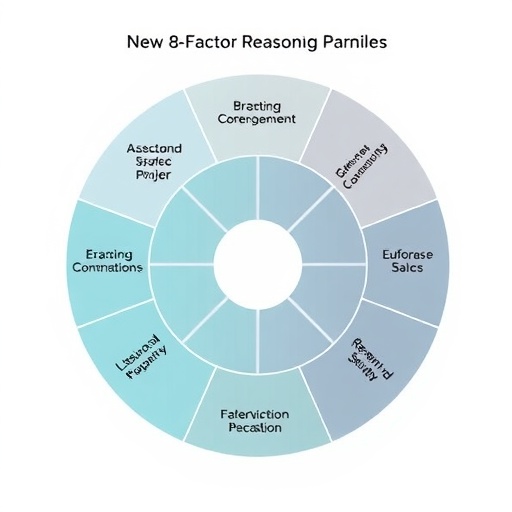In an era dominated by rapid information exchange and complex decision-making, understanding the cognitive processes that govern human reasoning has never been more crucial. A groundbreaking study by V. Duran and F. Çelık, recently published in BMC Psychology, introduces the 8-Factor Reasoning Styles Scale, a meticulously developed and psychometrically validated instrument designed to capture the multifaceted nature of human reasoning. This pioneering work not only advances theoretical frameworks but also offers practical implications for psychology, education, and cognitive science.
Reasoning styles, long acknowledged as pivotal in shaping how individuals approach problems and make decisions, traditionally suffered from oversimplified measurement tools. Prior models frequently categorized reasoning into binary or tripartite dimensions, often neglecting the nuanced ways people process information across different contexts. The 8-Factor Reasoning Styles Scale, therefore, marks a significant evolution by providing a comprehensive taxonomy that encapsulates a broader spectrum of reasoning tendencies.
The journey to develop this scale began with extensive theoretical groundwork. Duran and Çelık conducted a thorough literature review, synthesizing prevailing theories on cognition, logic, and decision-making. They identified eight distinct factors believed to represent the diverse cognitive styles individuals employ when reasoning through problems. These eight factors encompass dimensions such as analytical thinking, intuitive judgment, holistic consideration, rule-based deduction, and others, capturing the richness of human intellectual engagement.
To ensure the scale’s psychometric robustness, the researchers employed advanced statistical methodologies, including exploratory and confirmatory factor analyses, across diverse participant samples. This rigorous validation process revealed not only strong internal consistency but also construct validity, indicating that each factor uniquely contributed to explaining variations in reasoning styles. The scale’s multidimensional structure resisted oversimplification, bolstering its utility for both research and applied settings.
What sets this tool apart is its sensitivity to individual differences in reasoning that were previously underrecognized. For instance, it acknowledges that an individual may simultaneously exhibit strengths in both intuitive and analytical reasoning depending on situational demands. By capturing this complexity, the scale opens pathways for more personalized approaches in educational and therapeutic interventions, where tailoring to an individual’s cognitive style can significantly enhance outcomes.
Beyond validation, the study delved into practical applications. The scale’s developers envisage its integration into clinical psychology to improve assessments of cognitive flexibility and rigidity, which are relevant in mental health conditions such as anxiety and depression. Similarly, in organizational psychology, understanding employees’ reasoning styles can inform leadership development and team dynamics, optimizing problem-solving and innovation.
Moreover, the digital age’s data-driven decision environments highlight the need for tools like the 8-Factor Reasoning Styles Scale. Artificial intelligence systems and human-computer interfaces increasingly rely on understanding user cognition to tailor experiences. This scale can aid in designing adaptive technologies that resonate with diverse reasoning patterns, enhancing usability and user satisfaction.
One fascinating aspect of this research lies in its potential to bridge cross-cultural divides in cognition research. Reasoning styles are often influenced by cultural contexts, yet many existing scales are culturally biased or limited. Duran and Çelık’s methodology incorporated multicultural samples during the validation phase, suggesting that the scale possesses a degree of cross-cultural applicability, a vital feature for global research collaborations and multinational applications.
This research also challenges existing paradigms by emphasizing that reasoning is not a monolith but a dynamic interplay of multiple cognitive dimensions. Such an understanding promotes intellectual humility and encourages further exploration into cognitive diversity. As the scale gains traction, it may inspire a new generation of cognitive scientists to dissect reasoning with unprecedented granularity.
Furthermore, the scale holds promise for educational psychology, where understanding how students reason can help educators tailor instruction to diverse cognitive styles. This personalized pedagogical approach could foster deeper learning and critical thinking skills, equipping students to better navigate complex academic and real-world challenges.
Importantly, the authors highlight potential limitations and avenues for future research. They caution that while the scale performs reliably in their studied populations, ongoing validation across broader and more varied demographics remains necessary. Longitudinal studies could elucidate how reasoning styles evolve over time and under different cognitive demands, providing richer insights into human cognition.
In addition to psychological and educational settings, the scale’s implications permeate fields like marketing and behavioral economics, where consumer decision-making intricately ties to underlying reasoning styles. Understanding these factors enables more ethical and effective communication strategies, balancing persuasion with consumer autonomy.
The introduction of the 8-Factor Reasoning Styles Scale invites exciting possibilities for interdisciplinary dialogue. Neuroscience, for instance, could investigate the neural correlates of these reasoning dimensions, perhaps revealing distinct brain activation patterns corresponding to each factor. Such integrative research could deepen our understanding of the neural architecture supporting complex cognition.
As society grapples with the challenges posed by information overload, misinformation, and increasing complexity, tools that illuminate how people reason offer a beacon of clarity. The comprehensive nature of this scale equips researchers and practitioners alike with nuanced data to tackle these challenges, fostering enhanced decision-making across individual and societal levels.
In conclusion, the pioneering work by Duran and Çelık introduces a sophisticated framework to decode human reasoning with unparalleled depth and precision. The 8-Factor Reasoning Styles Scale embodies a milestone in psychometric assessment, promising to reshape our approach to understanding cognition. Its broad application potential—from clinical practice to education, technology, and beyond—marks it as a seminal contribution poised to influence diverse domains for years to come.
Article References:
Duran, V., Çelık, F. The 8-Factor reasoning styles scale: development, validation, and psychometric evaluation. BMC Psychol 13, 939 (2025). https://doi.org/10.1186/s40359-025-03320-9
Image Credits: AI Generated




